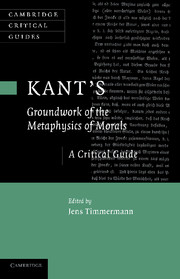Book contents
- Frontmatter
- Contents
- List of contributors
- List of translations and abbreviations
- Introduction
- 1 Ethics and anthropology in the development of Kant's moral philosophy
- 2 Happiness in the Groundwork
- 3 Acting from duty: inclination, reason and moral worth
- 4 Making the law visible: the role of examples in Kant's ethics
- 5 The moral law as causal law
- 6 Dignity and the formula of humanity
- 7 Kant's kingdom of ends: metaphysical, not political
- 8 Kant against the ‘spurious principles of morality’
- 9 Autonomy and impartiality: Groundwork III
- 10 Problems with freedom: Kant's argument in Groundwork III and its subsequent emendations
- 11 Freedom and reason in Groundwork III
- Bibliography
- Index
2 - Happiness in the Groundwork
Published online by Cambridge University Press: 04 August 2010
- Frontmatter
- Contents
- List of contributors
- List of translations and abbreviations
- Introduction
- 1 Ethics and anthropology in the development of Kant's moral philosophy
- 2 Happiness in the Groundwork
- 3 Acting from duty: inclination, reason and moral worth
- 4 Making the law visible: the role of examples in Kant's ethics
- 5 The moral law as causal law
- 6 Dignity and the formula of humanity
- 7 Kant's kingdom of ends: metaphysical, not political
- 8 Kant against the ‘spurious principles of morality’
- 9 Autonomy and impartiality: Groundwork III
- 10 Problems with freedom: Kant's argument in Groundwork III and its subsequent emendations
- 11 Freedom and reason in Groundwork III
- Bibliography
- Index
Summary
WHAT IS HAPPINESS?
Kant begins the Groundwork by putting happiness in its place. Happiness is not unconditionally good. Your happiness is not good unless you are worthy of happiness, and you are not worthy of happiness unless you have a good will. Right from the start, Kant has made it clear that the most important concept in ethics will be the good will, and he devotes the remainder of the Groundwork to elaborating and explaining what it is. This does not leave much room for happiness. But Kant does not neglect it altogether. In fact, he makes a number of intriguing suggestions, both about what happiness really is and the reasons, if any, we have to pursue it.
Kant first introduces happiness in the Groundwork as ‘that complete wellbeing and satisfaction with one's condition’ (G IV 393), and a little later links it with ‘enjoyment of life’ (G IV 396). What is satisfaction? We might think of it as a mental state of pleasure: a life of happiness is then a life of pleasure. Kant never explicitly explains what he takes satisfaction to be, but he does introduce a second conception of happiness, on which he concentrates in the rest of the Groundwork. On this second view, happiness is getting what you want, or more precisely, the idea of happiness is the idea of the sum total of inclinations (G IV 399, see also G IV 405, G IV 418).
- Type
- Chapter
- Information
- Kant's 'Groundwork of the Metaphysics of Morals'A Critical Guide, pp. 29 - 44Publisher: Cambridge University PressPrint publication year: 2009
- 19
- Cited by

